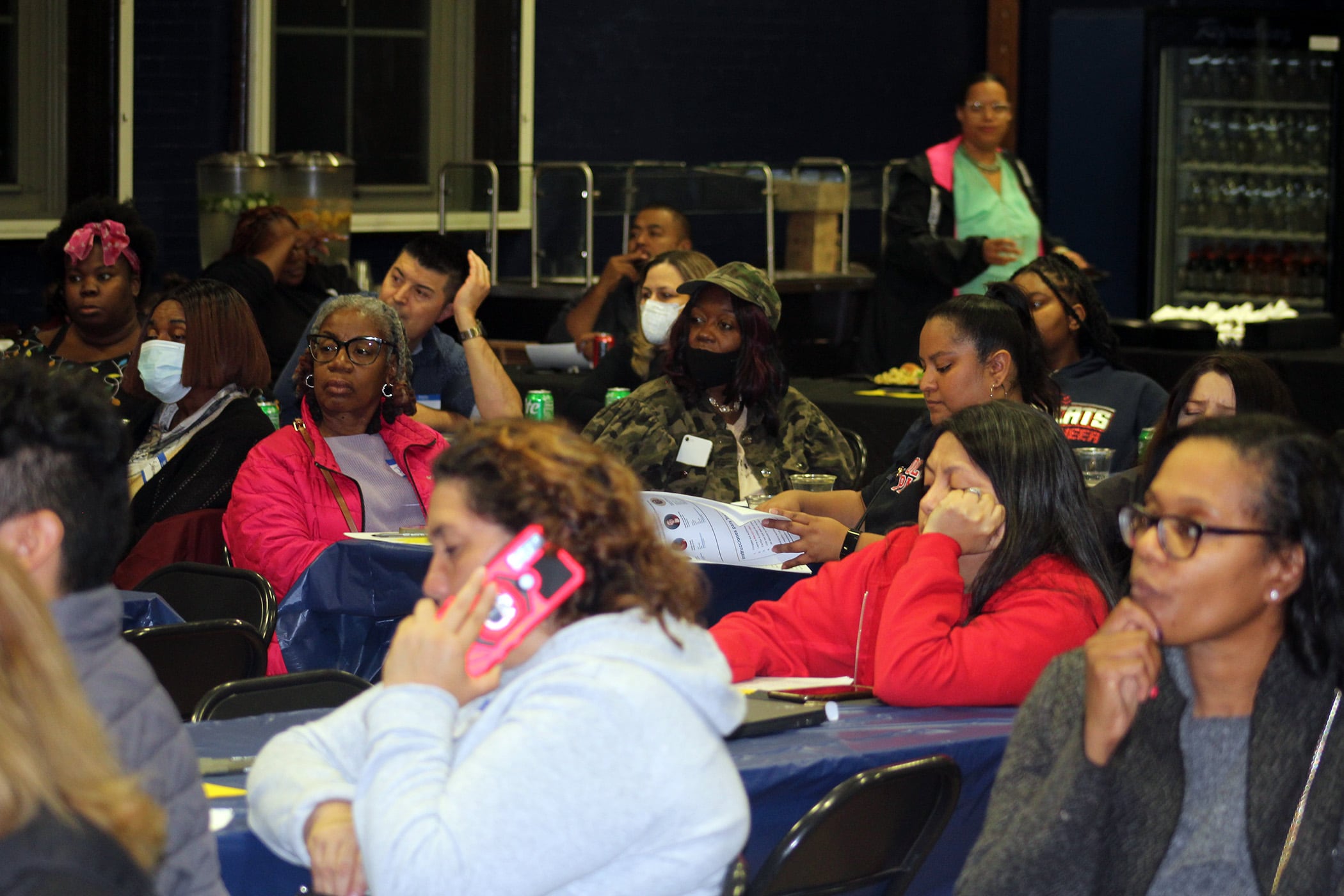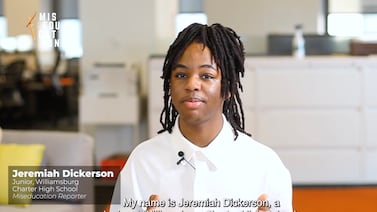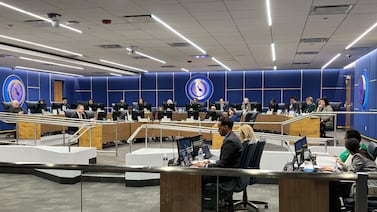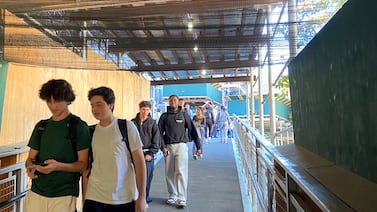“What happens if our school isn’t renewed?”
Claudia Rodriguez read aloud that question, which was submitted from an audience of more than 100 parents gathered inside Noble School’s UIC College Prep’s gymnasium in mid-October.
Rodriguez, the chief of public affairs at Noble Schools, answered confidently: Non-renewal isn’t really something we’re worried about.
Noble opened one of the first charter schools in Chicago in 1999, when the concept of privately managed public charter schools was brand new. Since then, Noble has expanded to 17 campuses, and the Chicago Board of Education has renewed Noble’s charter agreement four times.
Noble is one of a record 47 charter schools up for renewal in the 2023-24 school year. In all, about 27,600 students are enrolled at these campuses — more than half of the roughly 51,000 students enrolled in charters this year.
The high-stakes renewal process, which scrutinizes charter schools’ academic performance, financial practices, and operational compliance among other factors, comes at a pivotal time, as Chicago’s political landscape is shifting under a new mayor and looming school board elections. Charter communities wonder what it could all mean for their schools.
There’s been a trend toward shorter charter renewals that began under former Mayor Lori Lightfoot. In January 2020, the school board renewed seven charter operators for terms of five or more years. But in the years since, only two have received a renewal of five or more years, according to Chicago Board of Education records.
Lightfoot’s successor, Mayor Brandon Johnson, a former educator and organizer for the teachers union, has historically opposed charter expansion. During the mayoral election run-off, Johnson said that charter school expansion “forces competition for resources and ultimately harms all schools.”
But he has also stressed he does not oppose charter schools — and he is strongly against closing schools, which is what could happen if a charter is not renewed. There’s also a state-imposed moratorium on school closings in Chicago until 2025. The mayor’s office did not respond to Chalkbeat’s requests for comment.
An important limit on charter schools’ footprint is already in place for the next several months. In the 2019 contract agreement between Lightoot’s administration and the CTU, the district extended an agreement from 2016 to have a net zero increase in the number of charter schools until the contract expires in June 2024.
Johnson’s recently appointed school board will manage the charter renewal process alongside the CPS Office of Incubation and Innovation. Board President Jianan Shi is a former teacher who has taught at a district-run school in Chicago and a charter school in Boston. Before joining the board, he served as executive director of Raise Your Hand for Illinois Public Education, which has previously gotten funding from the Chicago Teachers Union Foundation.
CTU President Stacy Davis Gates believes the way the district handles charters altogether needs to change significantly. She wants more oversight of budgeting at charters and more-equitable engagement of parents and staff.
“The renewal process has to reflect the realities that we’re dealing with. There has been financial mismanagement, there is bloated administrative pay, there is a blind eye to culturally relevant curriculum and practices within the school community,” she said. “Now what do we do about it?”
In a statement, a district spokesperson said CPS is “committed to working with charter leaders and listening to members of our school communities to ensure we make the best possible decisions for our students.”
Nevertheless, charter school administrators, teachers, and parents are keeping a close eye on this year’s renewal process for a hint of what the future holds for the charter sector.
“I think renewal is very important in January,” said Andrew Broy, president of the Illinois Network of Charter Schools. “I think that will be a first signal from this board about what they think about charter public schools.”
The ‘renewal hamster wheel’ can impact classrooms
During the renewal process last school year, 11 of 13 charters up for renewal were granted terms lasting three years or less. In 2022, six of the seven charters up for renewal were given terms of three years or less.
Parents and staff in charter school communities have different views about what the renewal process can mean for charters.
Although Noble staff are confident about their renewal, Rodriguez said the possibility they and other charters might get a shorter contract is a concern.
“From a staffing point, it takes a lot of energy,” she said. “From our parents’ [perspective], the uncertainty and instability that that could cause if we’re always thinking in renewal mode.”
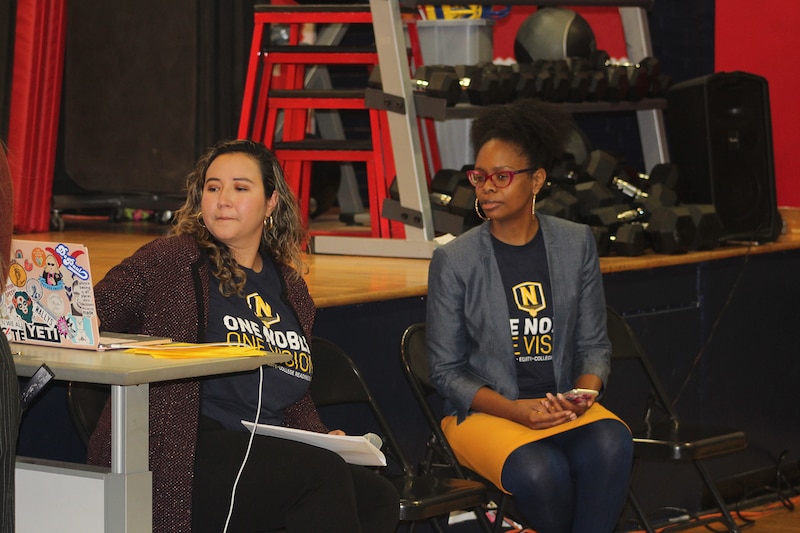
The heavy lift, Rodriguez said, is due to the large amount of paperwork required and the amount of data the school has to collect. In addition, Rodriguez — who runs the renewal process — said since the process requires reporting on different aspects of the school’s academic, operational, and financial performance, she has to pull in staff and educators from other departments to get the information she needs.
That, she says, “does take time and resources away from the work that we could be putting back into managing our schools and supporting our students.”
“Having to be in a renewal hamster wheel is not the best option for everybody,” Rodriguez said.
Stephen Palmerin, principal at Horizon Science Academy Southwest, feels roughly the same way.
His charter received just a two-year renewal last January, due to concerns about its suspension numbers compared to those of neighboring district schools, as well as the underperformance of elementary students with disabilities.
The K-12 school, which serves about 760 students, is working to reduce suspensions by 50 percent each year before its charter is up for renewal again in 2025. But Palmerin said it’s not entirely fair that Horizon Science’s stats are being compared to both elementary and high schools, since traditionally, elementary schools have lower suspension rates than middle and high schools.
And apart from his concerns about why his school got a relatively short renewal, Palmerin called the renewal process “so time consuming.”
“I wish people would keep the students at the forefront of all decision making,” he said.
But for some parents, the renewal process serves as a way to make sure their children’s schools hold up their end of the bargain.
Blaire Flowers, a parent liaison for education non-profit Kids First Chicago, which specifically supports Black and Latino families, said when her children were at Plato Learning Academy, a contract school, and North Lawndale College Prep, a charter, renewal season was when the schools would begin to “get themselves together.”
Plato is run by a different principal than when Flowers’ children attended three years ago. But at the time, she said, there was no Parent Advisory Council, which is meant to give parents a voice at schools that receive federal Title I funds for students from low-income backgrounds.
When renewal time came, the school established a PAC and began having meetings, created more programming, and held more enrichment events for students, such as a book fair and a Christmas gym shoe drive, she said.
“That’s when they were really doing what they were supposed to,” she said.
Plato received a two-year renewal term in January. Dating back to 2017, the district has given the school relatively low ratings for its financial status and student performance on standardized tests.
Hal Woods, the executive director of the Office of Innovation and Incubation from 2018 to 2020, said he advocated for more regular check-ins with schools to ensure they were staying on track and to make renewal time “a non-event.”
Giving shorter-term renewals to charter schools that aren’t in compliance is one way the board can show schools that they “mean business” and encourage them to do better, Woods said. But with school assessment data often coming in at renewal time, he felt like his office was playing catch up and addressing issues after they’d already taken a toll.
“I just want to make sure that CPS [is] providing better and more real time information to my old department so these things can be corrected in real time,” said Woods, who is now chief of policy at Kids First Chicago.
Palmerin said there is some concern among his staff about the Johnson administration’s sentiments about charters.
“I have no choice but to remain hopeful, because thinking that our days are numbered here, that’s going to affect our work,” he said. “I just know that if we’re committed to the work that we’re doing, let’s not give them an excuse but to give us a maximum renewal.”
Closing charters could be unlikely under moratorium
By law, a charter school must be given notice that they’re failing academically, operationally, or financially. And they must be given time to resolve the issues before officials can revoke a charter agreement and close the school.
The school can also appeal the decision to the Illinois State Board of Education and if successful, it can still operate under state management in Chicago. If that fails, they can appeal in court. That was the course recently taken by Urban Prep after CPS ended its charter; the state voted to uphold the district’s decision.
After a challenge in court, a Cook County Judge ruled that CPS could not “close, consolidate, or phase-out Urban Prep” until after the school closing moratorium expires in 2025.
Woods said he doubts that there will be any charter closings in the coming years, given the legal requirements and the appeal process. But more importantly, Woods said, “it’s very very hard to close a school … because every school is a community.”
At the same time, Woods said that charter expansion is also unlikely given the decline in school-aged children in the city over the past decade.
Flowers said charter schools have served her family well. Her daughter takes three buses to her school each day because Flowers wants her to take advantage of the Phoenix Pact college scholarship option available through North Lawndale.
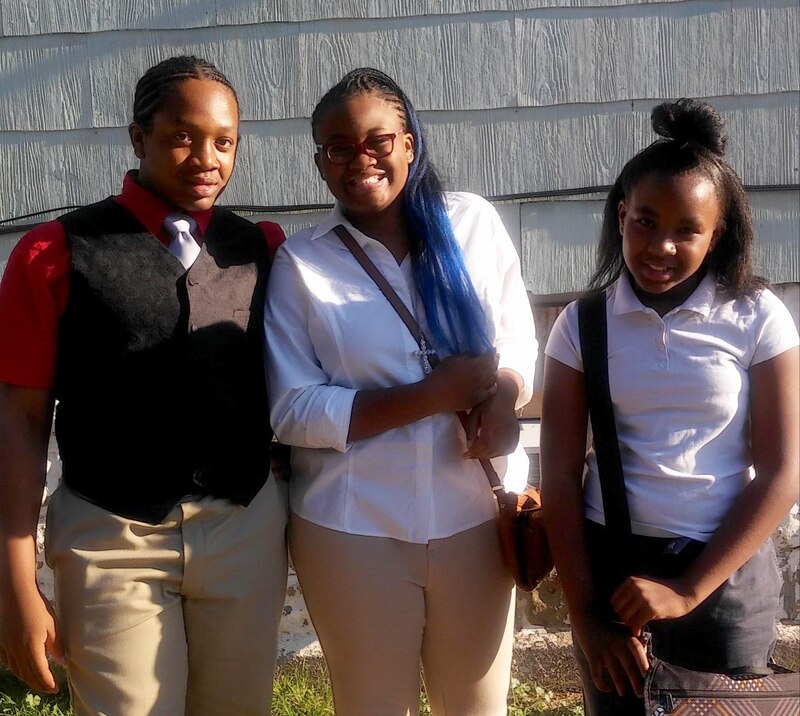
Nevertheless, Flowers said she does hope that the Johnson administration will “trim the fat” from the charter sector.
“Some of these charter schools are not really helping the community like they once were,” she said.
There is quite a bit of variation in student outcomes among Chicago’s charter high schools, according to a 2017 study by the University of Chicago Consortium on School Research, one of the first studies to evaluate Chicago charters according to metrics beyond test scores. The study considered school organization and policies, the incoming skills and characteristics of enrolled students, school transfers, and student performance.
“The single most important takeaway from the study was how much variation there is within the charter sector,” said Julia A. Gwynne, the senior research scientist on the study. “There’s a little bit of a tendency for people to see the charter sector as being sort of monolithic all one way or all another way. And we just didn’t find that to be true.”
With the uncertainty about what a new mayor and new school board will do, Rodriguez said Noble representatives are attending more board meetings and encouraging parents and staff to speak at them to provide “a holistic view of what Noble does in the community and how we support our overall community in Chicago.”
Despite the challenges of the renewal process, Rodriguez said she doesn’t necessarily think the process needs to change. But she does believe that all schools, including traditional public schools who might not be serving students well, should go through that process.
Gates, CTU’s president, said she’s hopeful the education backgrounds of the mayor and new school board will play a role in how the district handles charters going forward. She thinks that the charter renewal process needs to be overhauled to make sure teachers and families have a voice.
Self-proclaimed “charter school mom” Myisha Shields is working to have her voice heard — she spoke at a school board meeting in August and attended Noble’s parent meeting earlier this month. She has had three children graduate from Noble charter schools, and two are current Noble students.
“It’s almost like charters have to prove a point just to stay open. We have to work harder. We have to work our kids harder to prove that these should be an option in the city of Chicago,” she said. “I just wish they would stop making it so hard. It’s so unfair.”
Regardless of how the process changes or stays the same in the coming years, Myisha Shields has one request for everyone involved.
“Just listen to us,” said Shields. “Our kids deserve a great education.”
The Chicago Board of Education is expected to vote on the renewal agreements for the 47 charter schools in January.
Correction: Nov. 1, 2023: This story has been updated with the correct spelling of Julia A. Gwynne’s name. It has also been updated to clarify Plato Learning Academy is a contract school, not a charter.

